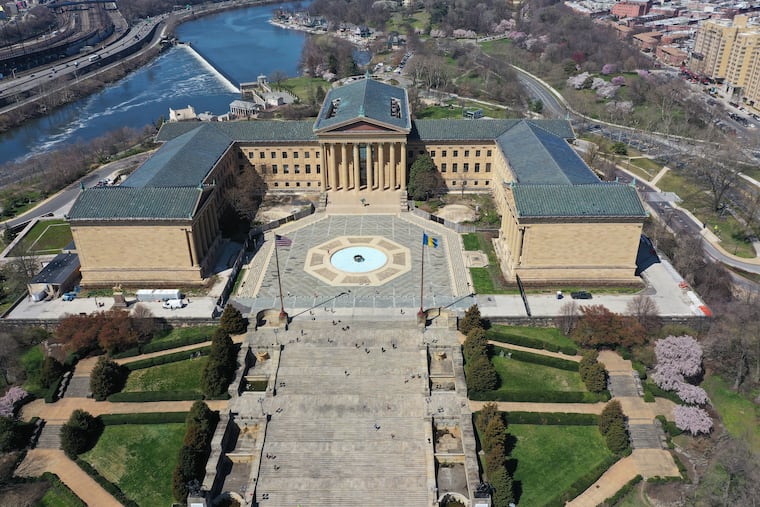Philadelphia Museum of Art extends closure to June 30 with staff salary cuts, but no layoffs
The museum is seeking to avoid layoffs as the coronavirus closure grinds on.

Amidst increasing COVID-19 pandemic fears, the Philadelphia Museum of Art announced Thursday that it would remain closed until June 30, reduce compensation for staff members making more than $30,000 annually, and cancel or postpone all exhibitions and programs through the spring and summer.
Museum officials said they were attempting to avoid layoffs.
In a statement, the museum said that its planning in the midst of the global pandemic also primarily seeks to maintain its collection and buildings — including the main building overlooking the Benjamin Franklin Parkway, the Perelman Building, the Rodin Museum, and two historic Fairmount Park Houses. All are closed.
All full-time and part-time workers will retain their health-care benefits, museum officials said.
“If we are able to reopen sooner than the end of June, we will do so,” said Timothy Rub, museum director and chief executive. “If the situation at that point necessitates an extension of this closure or if any other unforeseeable events occur then we will revise our plans to address these new conditions. We have to be flexible and take things as they come.”
He said the choice of June 30 was informed by a number of factors, including the possible duration of the pandemic.
“At that time, we’ll also be at a point — the end of our fiscal year — when we will be in a better position to know what can and cannot be done during the summer and fall,” Rub said. “We’re going to plan conservatively, but hope for the best.”
The museum, with about 475 staff members and an operating budget, in normal times, of roughly $60 million, said that since its March 13 closing, earned revenue from ticket sales, memberships, food service, parking, and store sales has evaporated.
The endowment, which has declined with financial markets in recent weeks, stood at about $487 million at the end of 2018.
The museum’s plan as outlined Thursday would see a reduction of the museum’s operating budget by about a third, a spokesperson said, largely through the salary reductions, but also through the elimination of a number of daily expenses, such as travel, printing, and mailing. The spokesperson declined to speculate on how much revenue the museum stands to lose if it is closed through the end of the fiscal year, June 30.
The board of trustees approved the plan Wednesday afternoon.
Just last week, the Franklin Institute, on Logan Square, announced sweeping layoffs, letting go all part-time and 36% of its full-time staff. Days before that, the Please Touch Museum in Fairmount Park cut its staff from about 70 to 19. The Franklin Institute is closed indefinitely and Please Touch is closed until at least May 18.
Both the Franklin Institute and Please Touch, the children’s museum, are more dependent on things like ticket sales for revenue than the Art Museum.
According to the plan, as outlined to The Inquirer, Art Museum employees with the largest salaries will face the biggest reductions, some as much as 60% at the executive level. A museum spokesperson said most reductions would be in the 20% range. Those employees with salaries under $30,000 will not see any reductions at all, the spokesperson said.
The museum’s massive construction project, known as the Core Project, was halted when the museum closed three weeks ago. But last week, the contractor, LF Driscoll, received a waiver of state restrictions on business and building activity and workers were back on the site.
The museum spokesperson said that Driscoll was “assessing” the project “trying to see what they could accomplish.” The spokesperson did not know if construction would continue once the assessment was complete.
The $228 million Frank Gehry-designed project aimed at radically transforming the museum interior and expanding gallery and public space by 90,000 square feet had been scheduled for completion in September. That was before COVID-19.
Thursday museum officials allowed that “an extended closure will also necessitate delays in the Core Project.” What that might mean is impossible to say, officials said, although it seems likely that the project will not come to a completion in September as planned.